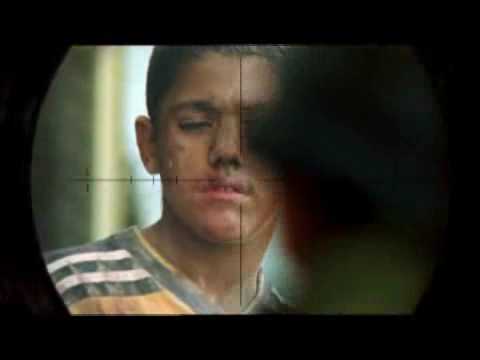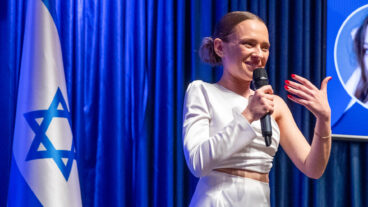For Israeli director Samuel Maoz, the making of his first feature film Lebanon was both a labor of love and an exorcism of demons – the love being cinema and the demons being the images of the Lebanon War he fought back in 1982.
The fact that the film succeeds in both endeavors is a testament to Maoz’s drive, vision and until now, unexploited talent. Seemingly coming out of nowhere, Lebanon beat other, more high-profile films including Michael Moore’s Capitalism: A Love Story, Todd Solonz’s Life During Wartime, Werner Herzog’s Bad Lieutenant: Port of New Orleans and John Hillcoat’s The Road to win the Golden Lion, the top prize, at the 66th Venice Film Festival last month and bring Lebanon to international awareness.
Lebanon’s world premiere took place in August at the Jerusalem Film Festival. The movie is based on Maoz’s battle memories from when he was a tank gunner in the war. The hard-hitting film is shot almost entirely from the perspective of the soldiers inside the tank.
It stars well-known Israeli actors Oshri Cohen, Yoav Donat, Itay Tiran, Michael Moshonov and Zohar Strauss, and is uncompromising in its depiction of the confusion of war, the inevitability of casualties (both civilian and military), and the claustrophobia of being stuck inside a machine that protects soldiers but can become a death trap at any moment.
“I didn’t want the audience just to understand the story but to feel it,” Maoz told the Financial Times. “Because feeling is understanding. I want the audience inside the tank so they totally identify with the actors. You only see what they see. You only know what they know. What I asked from my designer… was that we don’t just see and hear the experience of being there, we smell and taste it.”
‘An astonishing piece of cinema’
Maoz must have succeeded in his task because reactions to the film have been superlative. Variety described Lebanon as the boldest and best of the recent mini-wave of Israeli movies; The New York Times called it “an astonishing piece of cinema.”
Born in Tel Aviv in 1962, Maoz began making short films after receiving an eight millimeter camera as a bar mitzva present. Following his army service and his graduation from film school in 1987, Maoz has been an active figure in the Israeli cinema world, primarily working as an art director and a director of commercials.
But despite his thriving career, Maoz’s thoughts kept coming back to the war in Lebanon. He attempted to write a script about his experiences in the six years following the war, but the events were still too fresh in his memory, he told the Financial Times, so he shelved the project.
“Then in 2006 I was watching news of the second Lebanon war and I thought, ‘In 25 years nothing has changed.’ I was very depressed, also, because I was 45 and thought I must do something with my life. I started writing again and suddenly I couldn’t stop. I felt like a rocket trembling before take-off. I wrote the script in four weeks,” he said.
According to Maoz, the process of making the film was deeply cathartic, and he hopes it will help other veterans who have remained traumatized by the war.
A memory that is stabbed on the soul
“Making this film has got me my life back and that is more precious than any award. Without fully knowing it, I have been deeply traumatized since 1982, as has a whole generation of Israelis, people who are now running the country. Making Lebanon and finally confronting what happened in that war has given me my true feelings back and I can cry real tears once more,” he told reporters after winning the award in Venice.
Along with Waltz With Bashir and Beaufort, two other Israeli films about the Lebanon War, both of which were nominated for Academy Awards, Lebanon is a bold attempt to dredge up a troubled part of Israel’s history to enable those involved to shed some of the shadows they’ve been carrying around for 17 years.
“I dedicate this work to the thousands of people all over the world who, like me, come back from war safe and sound,” said Maoz at the closing ceremony of the Venice festival. “Apparently they are fine, they work, get married, have children. But inside, the memory will remain stabbed in their soul.”
Immediately after winning the top prize, Maoz told Israel TV in a phone interview that he hopes the movie “helps people understand our country better, understand our society better, and the complexity of our society better.”













